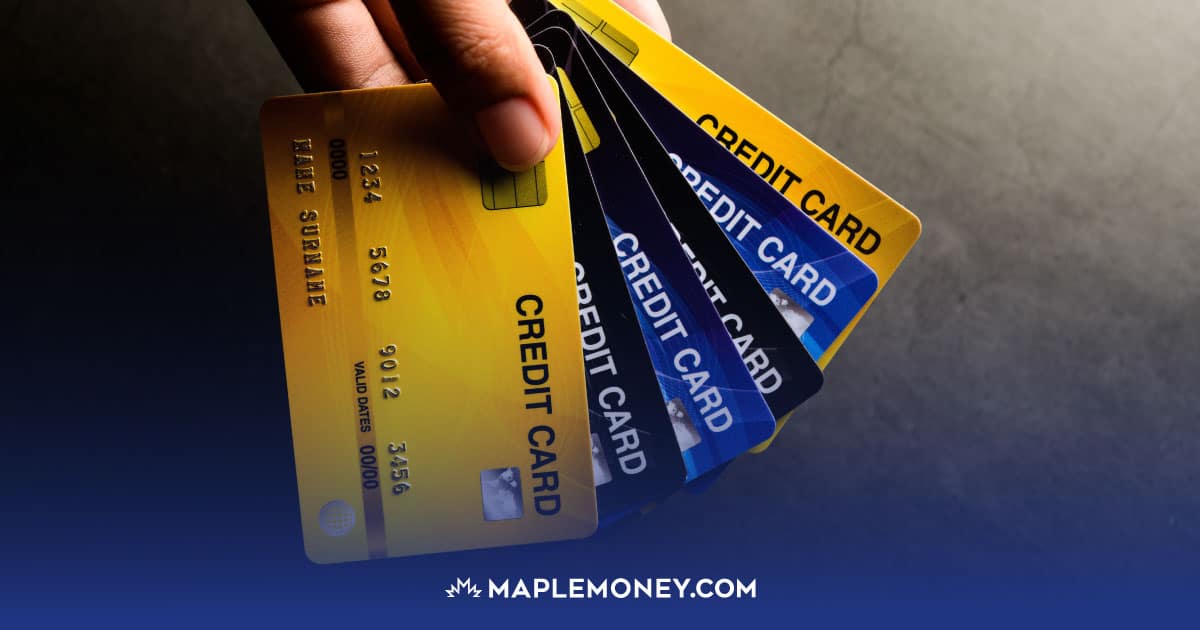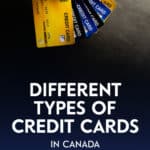Different Types of Credit Cards in Canada

For the uninitiated, choosing the right credit card can be a daunting task. With so many different types of credit cards to choose from in Canada, along with their many features and benefits, how do you know which card is right for you?
From no-fee cards to student cards to travel and cash back rewards cards, there is a credit card for just about everyone. That’s why it’s so important to understand the different types before you apply.
In this article, I’ll help you sort things out by sharing the main categories that most credit cards fall into. This guide will give you the confidence to find the ideal credit card for your situation.
6 Types of Credit Cards in Canada
1. No-fee Credit Cards
No-fee credit cards allow you to enjoy the benefits of having a credit card without worrying about paying an annual fee. But while most no-fee credit cards offer lower credit limits and fewer rewards or perks than other cards, more and more credit card companies are enticing customers with added benefits on their no-fee cards.
- Recommended No-Fee Credit Card: The Tangerine Money-Back Card is a no-annual-fee Mastercard that pays 2% bonus cash back in two spending categories of the cardholder’s choice. All other purchases earn 0.50% cash back. Bonus spending categories include Grocery, Furniture, Restaurants, Hotel-Motel, Gas, Drug Store, Recurring Bill Payments, Home Improvement, Entertainment, and Public Transportation and Parking.
Apply for the Tangerine Money-Back Card
2. Rewards Credit Cards
Rewards credit cards are designed to help you earn points, miles, cash back, or other rewards for each dollar you spend. The earning rates and redemption options vary by issuer, so it’s important to find a card that matches your spending habits and preferences, so you can maximize the value you get from your rewards credit card.
Some cards offer premium rewards rates, but they charge higher annual fees, and the approval criteria are more strict. Take the Westjet RBC World Elite Mastercard, for example. It’s a premium rewards credit card that allows you to earn Westjet Dollars and includes an annual companion pass and other benefits, including free checked bags on WestJet flights.
But the card has an annual fee of $119, plus $59 for a supplementary card, and a minimum annual income requirement of $80,000 per individual or $150,000 per household.
Most, but not all, rewards credit cards fall into one of two categories: Cash back and travel rewards cards. Let’s take a closer look at these two types of credit cards.
Cash Back Credit Cards
Cash back credit cards pay you a percentage of your purchases back in cash or as a statement credit. Depending on the card, you may have tiered cashback rates for certain spending categories. For example, you might earn more cash back when you spend money on groceries, gas, or at restaurants.
If you’re shopping for a cash back credit card, look for one that offers bonus cash back in the categories where you spend the most money each month. If you have a large family, it might be groceries. If you put a lot of mileage on your car, look for a card that pays extra cash back on gasoline purchases.
- Recommended Cash Back Credit Card: The Scotia Momentum Visa Infinite Card pays a whopping 4% cash back on grocery purchases and recurring bill payments. You also get 2% for gasoline and transit purchases and 1% cash back on all other spending. You can redeem your accumulated cash back once per year as a statement credit. The card does charge a $120 annual fee, which is well worth the cost if you can maximize the card’s benefits.
Apply for the Scotia Momentum Visa Infinite Card
Travel Credit Cards
Travel credit cards are perfect for those who love to explore the world. These cards let you earn travel rewards and offer perks like discounted flights, hotel stays, and car rentals. Some travel cards come with additional benefits like airport lounge access or travel insurance. However, these cards may have annual fees, so weigh the benefits against the costs to determine if they work for you.
- Recommended Travel Rewards Card: The TD Aeroplan Visa Infinite Card allows you to earn points in Canada’s most valuable airline rewards program, Aeroplan. Cardholders earn bonus points on eligible gas, grocery, and Air Canada purchases and 1 Aeroplan point on all other purchases made with the card. The annual fee is $139, and there is a minimum income requirement to qualify, but the card has many additional benefits and is ideal for frequent travellers, especially those who prefer to fly with Air Canada and its partners.
Apply for the TD Aeroplan Visa Infinite Card
3. Business Credit Cards
Business credit cards are designed for use by entrepreneurs and small business owners. These cards are very similar to personal credit cards, but they can be issued in your business name. This makes it easier to separate your personal and business spending.
Many business cards also come with higher credit limits and the ability to add employees as additional cardholders. Make sure to find a card that suits your business needs and helps you manage your finances efficiently.
- Recommended Business Credit Card: The RBC Avion Visa Infinite Business Card lets you earn valuable Avion points on your business purchases. You can then redeem your points on everything from travel to merchandise and gift cards to statement credits. The card does have a hefty $175 annual fee, but the card has a generous welcome bonus along with free tools that make it easier to manage your business expenses.
4. Student Credit Cards
Student credit cards are regular cards meant for young adults who are just starting to build credit. These cards usually have low credit limits and no annual fees. They may also offer modest rewards. By using a student credit card responsibly, you can begin building your credit history and learn to manage your budget effectively.
- Recommended Student Credit Card: The BMO Cash Back Mastercard for Students doesn’t charge an annual fee while offering new cardholders a welcome bonus of 5% cash back for the first three months. In addition, the card pays 3% cash back on grocery purchases, 1% cash back on recurring bill payments, and 0.5% cash back on all other purchases. Not bad for a no-annual-fee card.
5. Secured Credit Cards
Secured credit cards are designed for people with no established credit or who have struggled with poor credit in the past. When you get a secured credit card, you must put down a refundable security deposit, which is usually equal to your credit limit. The card issuer can offer secured credit cards to borrowers with a higher-risk profile because the cards are backed by a security deposit.
As you use your secured credit card and make regular monthly payments, it’s helping you build credit and improve your credit score over time. Secured cards still charge interest like unsecured credit cards, so it’s crucial to pay the balance in full every month. Most secured credit cards do not charge an annual fee.
- Recommended Secured Credit Card: The Neo Secured Card has no annual fee, and unlike most secured credit cards, it offers a rewards program. According to Neo Financial, cardholders earn an average of 5% cash back when purchasing at Neo retail partners. All cardholders earn a minimum of 0.50% cash back. Another nice feature is the low deposit requirement. You can open an account with as little as $50 security.
6. Prepaid Credit Cards
Prepaid credit cards offer users the convenience of a credit card without having to worry about interest charges and racking up credit card debt. That’s because, with a prepaid credit card, you’re not actually borrowing money. Instead, you’re spending money that you already deposited into your account.
Prepaid cards allow you to make purchases in stores or online, usually wherever Visa or Mastercard are accepted. And when travelling, prepaid credit cards are more secure than carrying cash. If you’re unable to qualify for a regular credit card, a prepaid credit card may help you build credit (check with the issuer before you apply.) Most prepaid cards are no-fee cards, although some cards charge a fee while offering additional rewards.
- Recommended Prepaid Credit Card: The KOHO Extra Mastercard is one of Canada’s most popular prepaid credit cards, but it charges an annual fee of $108 ($9 per month). I prefer the no-fee version, the KOHO Easy Mastercard. It features a reduced foreign exchange fee of 1.5%, and cardholders earn 0.5% interest on their prepaid balance.
Final Thoughts on the Different Types of Credit Cards
Before you choose any credit card, be mindful of your spending habits. You also need to consider factors like annual fees, bonus categories, and additional benefits, like insurance coverage. Find a card that fits your lifestyle and has rewards that align with your spending patterns.
FAQs
What are the main credit card categories?
The main credit card categories include no-fee credit cards, cash back credit cards, and travel rewards cards.
What are the differences between Visa, Mastercard, and American Express?
Visa, Mastercard, and American Express are all major payment networks that provide the infrastructure for processing credit card transactions. When it comes to differences, Visa and Mastercard have similar features and benefits but are more widely accepted by merchants than American Express.
Both often offer zero liability for unauthorized transactions and additional perks like travel insurance and purchase protection. American Express is often considered a more premium option with a reputation for excellent customer service and higher-tier rewards.
Which credit cards are best for beginners?
Most beginners should focus on low fees and building credit rather than earning rewards. For that reason, I recommend a student credit card (if applicable) or a regular no-fee credit card. Keep in mind that some no-fee cards, like the aforementioned Tangerine Money-Back Card, do earn rewards.

